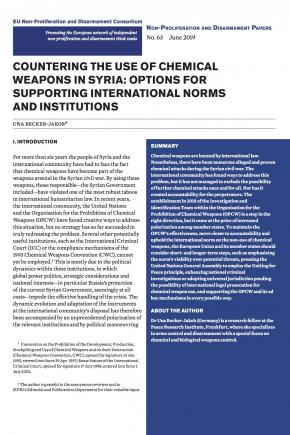Countering the Use of Chemical Weapons in Syria: Options for Supporting International Norms and Institutions
Chemical weapons are banned by international law. Nonetheless, there have been numerous alleged and proven chemical attacks during the Syrian civil war. The international community has found ways to address this problem, but it has not managed to exclude the possibility of further chemical attacks once and for all. Nor has it created accountability for the perpetrators. The establishment in 2018 of the Investigation and Identification Team within the Organisation for the Prohibition of Chemical Weapons (OPCW) is a step in the right direction, but it came at the price of increased polarization among member states. To maintain the OPCW’s effectiveness, move closer to accountability and uphold the international norm on the non-use of chemical weapons, the European Union and its member states should consider short- and longer-term steps, such as emphasizing the norm’s viability over potential threats, pressing the United Nations General Assembly to employ the Uniting for Peace principle, enhancing national criminal investigations or adopting universal jurisdiction pending the possibility of international legal prosecution for chemical weapon use, and supporting the OPCW and its ad hoc mechanisms in every possible way.

